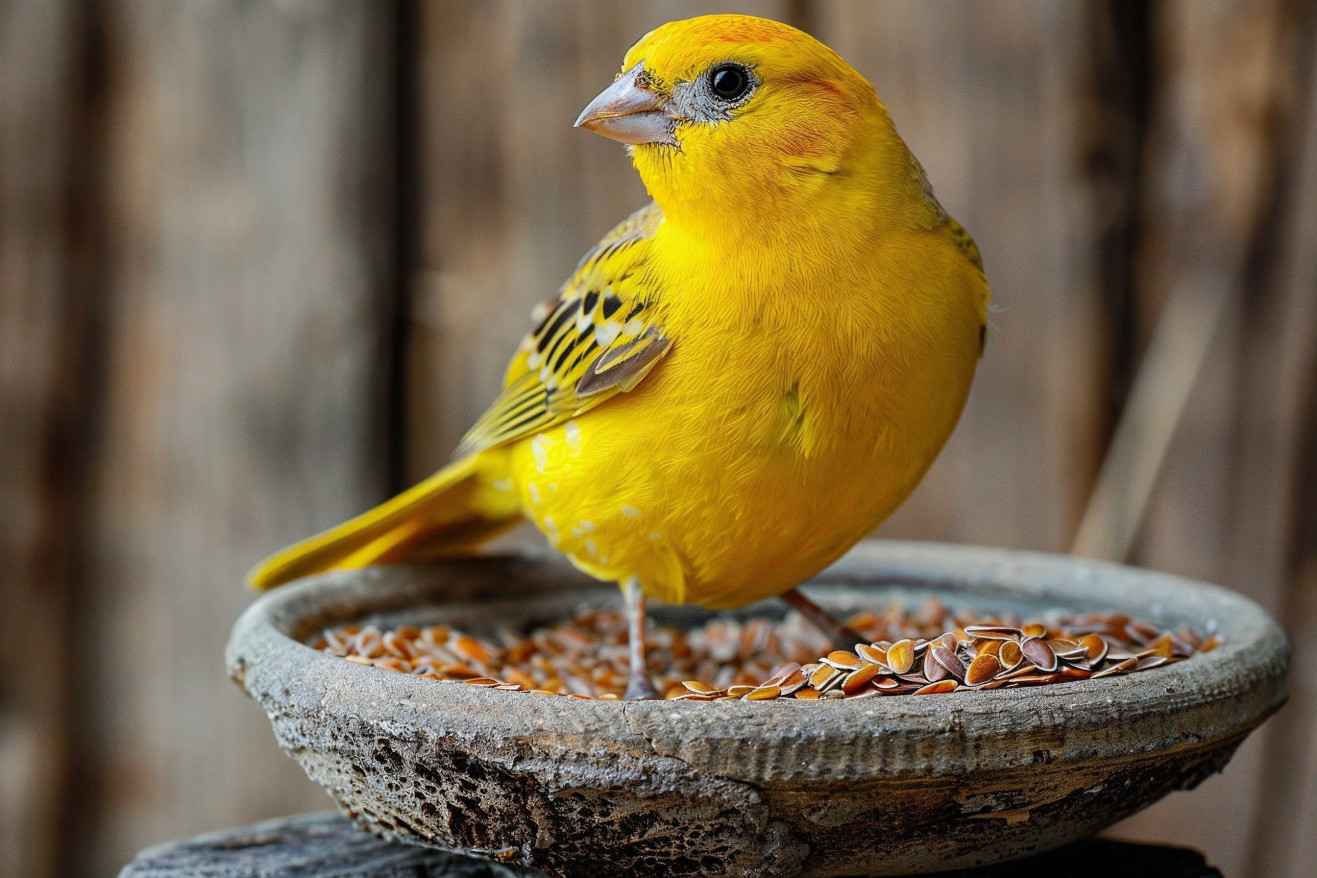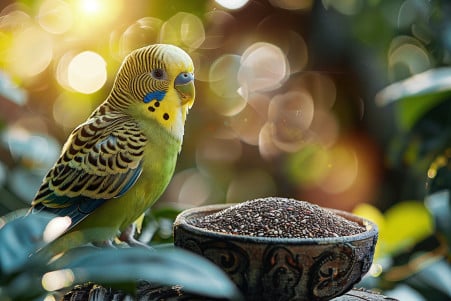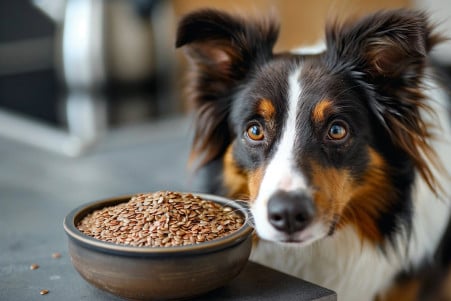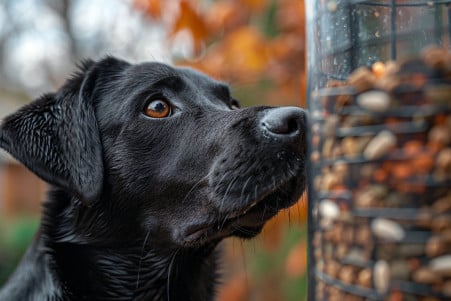Can Birds Have Flax Seeds? What Birds Eat and Need
7 June 2024 • Updated 5 June 2024

If you want to attract more birds to your yard, you may be wondering if flax seeds are a good option to include in your bird feed. While flax seeds are safe for most birds to eat in moderation and can be a good source of omega-3 fatty acids, fiber, and protein, they should be a small part of a balanced diet. This is because too many flax seeds can lead to digestive problems in birds.
While the importance of offering birds seeds they like is one aspect of attracting birds to your yard, we will also look at studies that have been done on the nutritional needs of different types of birds. From how many birds are exposed to flax seeds in the wild to the importance of insects and plants in their diets, this article will help you make the most of your birdwatching hobby. By learning more about what birds need to eat, you can make sure that the birds that come to your yard are healthy and want to come back year after year.
Can birds eat flax seeds?
Nutritional Benefits of Flax Seeds for Birds
Flax seeds are a nutritional powerhouse for birds, and they come with a number of benefits. For one, flax seeds are a great source of omega-3 fatty acids, which are important for a bird’s feathers, bones, and immune system. The fiber in flax seeds is good for digestion, and the seeds also offer a bit of plant-based protein to help birds stay active.
One of the best things about flax seeds is their high oil content. This is a great source of energy, and it can be especially helpful during breeding and molting seasons when birds need extra calories to get through these times. In addition to these macronutrients, flax seeds also offer a variety of essential micronutrients like vitamins and minerals that can help birds stay healthy and strong.
Overall, adding flax seeds to a bird’s diet can help them get the nutrients they need to grow, thrive, and be healthy. That said, like anything else you add to a bird’s diet, it’s important to make sure you’re adding flax seeds in a way that’s moderate and balanced so that your bird gets the benefits of this superfood without experiencing any negative side effects.
Safe Feeding Practices: Everything in Moderation
Flax seeds should be given to birds in moderation to avoid nutritional imbalances and other potential health concerns. According to the Avian Avenue Parrot Forum, the amount of flax seeds that should be given to birds depends on their size, with smaller birds requiring as little as a teaspoon per day and larger birds requiring up to a tablespoon.
Flax seeds should be added to a bird's diet slowly and their reaction should be closely monitored for signs of discomfort or digestive upset. Parrot Forums - TalkParrots recommends that flax seeds can be given whole or ground, but that smaller birds may prefer ground flax seeds as it's easier for them to digest. A well-rounded diet that includes other foods, like fresh fruits and vegetables, is important when adding flax seeds to a bird's diet.
Potential Dangers and How to Stay Safe
Although flax seeds can be a healthy addition to your bird's diet, there are some potential dangers to be aware of. According to Chirp Vendors, the high fat content in flax seeds can cause weight gain and decreased female reproductive success if consumed in large amounts. In addition, birds with liver or kidney problems should avoid flax seeds because they can be hard on these organs.
It's also important to make sure that the flax seeds you're giving your bird are fresh and not rancid, as Poodles and Parrots notes that rancid seeds can be toxic. To avoid these dangers, Pet Food Safety suggests working with an avian vet or nutritionist to develop a custom feeding plan that takes into account your bird's unique dietary and health needs.
How to Prepare and Store Flax Seeds for Birds
Flax seeds can be given to birds in their whole form or ground, although smaller birds may have an easier time digesting the seeds if they are ground. According to Morning Bird Products, flax seed powder is easier to feed than whole flax seed and is also high in omega-3 fatty acids.
It is important to store flax seeds properly to avoid them becoming rancid, which can be toxic to birds. The Feed Strategy article suggests storing flax seeds in an airtight container in a cool, dry place, away from light and moisture. Ground flax seeds have a shorter shelf life than whole seeds and should be used within a few weeks of grinding.
To make things easier, bird owners can also purchase flax seed powder or meal, which is already ground and can be sprinkled directly onto a bird's food. This can help ensure that the seeds are fresh and easy for their birds to digest.
Research on Flax Seeds and Bird Nutrition
A number of studies have investigated the impact of flax seed consumption in a variety of bird species, including laying hens and breeders. One study published in the Journal of Poultry Science notes that feeding flax seeds to hens has been shown to increase the omega-3 fatty acid content in their eggs, leading to the production of more nutritious eggs.
On the other hand, some studies have shown potential negative effects. The same study found that hens fed high levels of flax seeds showed decreased feed intake, lower body weight, and an increased incidence of liver hemorrhages.
Another study published in PMC indicates that negative effects of flax seed consumption can be mitigated by proper nutrient balancing and supplementation, such as the addition of pyridoxine (vitamin B6). In general, these studies show that it's important to use flax seeds in moderation and to closely monitor their impact when adding them to a bird's diet.
How to Introduce Flax Seeds Into a Bird's Diet
As with any new food, it is important to introduce flax seeds into a bird's diet slowly to avoid digestive upset. Per ChicMose, this means starting with a small amount of flax seeds mixed into the bird's regular food and gradually increasing the amount of flax seeds over the course of a few weeks. Make sure to pay attention to the bird's appetite, weight, and droppings during this time to make sure that they are adjusting well to the new food.
If the bird is not eating the flax seeds or seems to be having issues adjusting to them, Kaytee recommends adjusting or slowing down the process. Bird Tricks Store notes that it can take months for a bird to adjust to a new diet, so it's important to be patient and consistent.
Conclusion: Adding Flax Seeds to a Healthy Bird Diet
When given in moderation and as part of a balanced, varied diet, flax seeds can be a healthy addition to a bird's diet. They offer omega-3 fatty acids, fiber, and some protein, but they should not be the only or main source of nutrition.
Properly preparing, storing, and introducing flax seeds to a bird's diet is important to make sure they are safe and beneficial for birds. Bird Tipper notes that flax seeds should only be a small part of a bird's diet because too much can lead to digestive problems.
It's best to work with avian professionals or veterinarians to come up with a feeding plan that works for your bird's specific nutritional and health needs. Chirp Vendors warns to watch out for potential health problems that can result from feeding birds flaxseed, including heart disease and sensitivity.
By learning about the benefits, potential drawbacks, and how to best feed flax seeds, bird owners can help ensure their pets are as healthy as possible.


